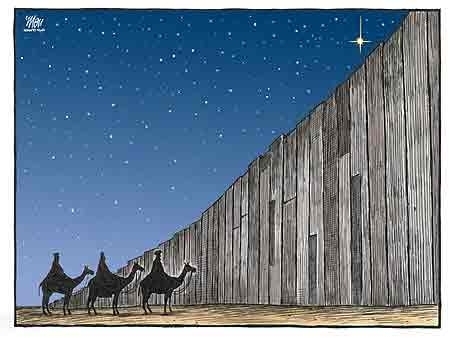Diwali, or Deepavali as it is called in the south, is a joyous occasion but this time it has brought only tears. What a bizarre Deepavali it is this year, with the awful blazing fires in the sky and the earth, with ear-splitting sound from non-stop bombing. I may not be in Gaza, but my mind refuses to leave the place and my very soul shudders each moment.
Continue reading Diwali in times of War against ChildrenTag Archives: Israel
Oppose the Communally Motivated Proposed Amendments to the Citizenship Act, 1955 : Delhi Action Committee for Assam
Guest Post by Delhi Action Committee for Assam
The proposed amendment to India’s Citizenship Act, 1955 has raised grave concern among democratic circles in Assam and in other parts of the country. The proposed amendment reads that “persons belonging to minority communities, namely, Hindus, Sikhs, Buddhists, Jains, Parsis and Christians from Afghanistan, Bangladesh and Pakistan, who have been exempted by the Central Government by or under clause (c) of sub-section (2) of section 3 of the Passport (Entry into India) Act, 1920 or from the application of the provisions of the Foreigners Act, 1946 or any order made thereunder, shall not be treated as illegal migrants for the purposes of this Act” and that for persons belonging to the aforementioned minority communities, “the aggregate period of residence or service of a Government in India as required under this clause shall be read as ‘not less than six years’ in place of ‘not less than eleven years’.” The proposed amendment which is being considered by a Joint Parliamentary Committee is indeed is a matter of grave concern for the whole of India. Government officials have claimed that the decision to grant Indian citizenship to the above mentioned discriminated religious communities in neighbouring countries is premised on ‘humanitarian grounds’. Notwithstanding this benevolent claim by the government, one needs to carefully place this proposed amendment in perspective.
The proposed amendment is premised on the religious persecution of non-Muslim minorities in neighbouring Muslim majority countries. While religious basis have ‘softly’ underlined India’s approaches to the issue of immigration since the Partition, what is alarming with the amendment proposed by the current government is its vehement attempt, in the garb of humanitarianism, to upturn the Constitution of India by slyly trying to introduce religious right-to-return. The current government displays zero or very little humanitarian concern for non-Hindu marginalised communities in the country and in neighbouring countries.
Unlike Israel, Korea (both South and North), and few other countries, Indian law and the Constitution till today doesn’t recognise any notion of ‘Right to return’. This is the first time, when a sort of religious ‘right to return’ – is being advocated by the law-makers. To reiterate, this runs contrary to the secular fabric of the Constitution.
Further apart from complicating the already vulnerable demographic cauldron of the state of Assam, the circumstances under which the amendment is sought to be carried out raise questions about the federal structure of the country. The proposed amendment overrides the Assam Accord of 1985 which sets the date of 24 March 1971 as the cut off date for categorisation of illegal foreign immigrants to Assam, irrespective of Muslims or Hindus. In 1986 the Citizenship Act was amended and Article 6A was inserted. Retrospectively Article 6A granted citizenship to all those who entered Assam on or before 24 March 1971. How many amendment to Citizenship Act is required? Ain’t the amendments made after the Assam Accord of 1985 not enough?
We strongly demand that the proposed amendment to the Citizenship Act 1955 be immediately withdrawn.
Join the Protest Demonstration Against Citizenship (Amendment) Bill, 2016, at 2 pm, 29th September, Jantar Mantar
Strange yet familiar – race politics in the USA

Here is a link to Jon Stewart on race politics in the USA, in the context of the recent shooting by a white cop of a black unarmed teenager in Ferguson.
See any resemblances to our own fair country and the politics of caste, class, gender and community here? So familiar are the doubts expressed, questions raised, biases proudly stated, you could be pardoned for thinking it’s not the US of A, but Mera Bharat Mahan. Continue reading Strange yet familiar – race politics in the USA
When David Became Goliath: Lee-Alison Sibley
Guest post by LEE-ALISON SIBLEY
Back in the 1960s when Hollywood was making a number of movies based on biblical stories, they came out with Orson Welles as King Saul in “David and Goliath.” I was a little kid when I saw this movie, but I remember identifying with little David who yes, played beautifully on his harp, and used his slingshot with divine accuracy. I also remember the monster Goliath – he was huge and ugly and represented the Philistines, our enemies. I cheered in my head and my heart for David to defeat the monster and he did, so that I could feel the good guys won and God was indeed on our side, the side of the Israelites.
Like any idealistic Jew, though not religious, I went to Israel to work on a kibbutz in the summer of 1971. I was in the south, near Eilat and the border with Jordan. Young and naïve, I was friendly with everyone I met — the Sabras of Israel, the Christians in Bethlehem, and Arabs in Gaza. In Gaza? Yes, I was there with a British fellow from the kibbutz who was picking up some cane furniture he had ordered. I wasn’t supposed to be there, of course, and when an Israeli army jeep spotted me, my friend was in big trouble. “Get her out of here immediately!” was the order he shouted. I guess it had something to do with my appearance and that there were no other women on the street at that time. Like I said, I was friendly with everyone – my parents did not raise me to hate, they raised me to love. The Israelis tried to make me feel guilty for not staying in Israel, but I kept saying, “I’m an American, my home is the U.S.A.” Still, I certainly supported Israel and every person I met there had lost someone, a family member or a friend in a war and I felt very sad for them and angry that they lived with the constant threat of attack. Continue reading When David Became Goliath: Lee-Alison Sibley
Spring in Israel? Internal voices of dissent grow
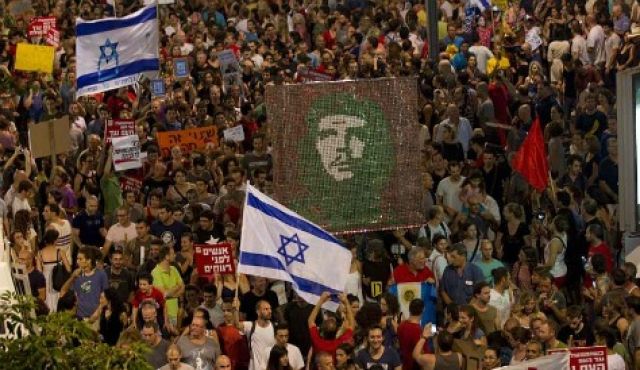
Over 150,000 social justice protesters took to the streets of 11 cities across Israel.These protests, which some are calling part of an “Israeli Spring”, began initially in response to the country’s housing crisis. But since as they began gaining momentum, they have spread to a host of social and economic complaints, including overlap with the struggling Israeli peace movement.
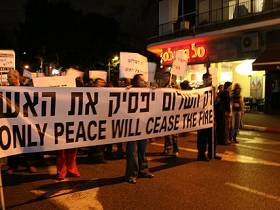
Concerned Public Health Professionals on the Israeli attack on Gaza
The following is a statement issued by some concerned public health professionals in New Delhi, on 21st July, 2014
The world is once again witness to the macabre dance of death in Gaza unleashed by the Israeli aggressors, and once again the news of scores of innocent Palestinian deaths, including those of a number of women and children, is flooding in. The tragedy is compounded many-fold by the conspiracy of silence on this issue entered into by all the major powers of the world, who have singularly failed to take any effective measure to restrain the Israeli aggressors. The only exception to this silence is USA, Israel’s long time sponsor, which has once again blocked efforts at the United Nations to pass any motion of censure against Israel.
Israel’s alibi for the latest attack – to punish perpetrators of abduction and murder of three Israeli boys, holds little merit when Israel is the occupying force in first place and its leaders are belligerently calling for annihilation of ordinary Palestinian lives without discretion in accordance with their doctrine of ‘collective responsibility.’ The deputy speaker of Israeli Knesset, Moshe Feiglin has called Arab people “a gang of bandits” and has argued in favor of Israeli government cutting off electricity supply to Gaza in order to paralyze its hospitals. His reported statement is – “The blood of a dialysis patient in Gaza is not redder than the blood of our IDF (Israeli Defense Forces) soldiers who will, God forbid, need to enter Gaza.” Continue reading Concerned Public Health Professionals on the Israeli attack on Gaza
Life in a ‘Sterilized’ Zone, Hebron, Palestine: Ravinder Kaur
Guest Post and Photograps by RAVINDER KAUR
Map of Hebron, Courtesy ‘Breaking the Silence‘
On 12th June, 2014, the kidnapping of three Israeli teenagers near Hebron resulted a massive military search operation in the area. Since 30th June when their dead bodies were found north of Hebron, a Palestinian teenager has been abducted and killed in a revenge attack in East Jerusalem, and concerted air strikes have been launched on Gaza by the Israeli forces as punishment to Hamas who Israel holds responsible for the abduction and murder of the teenagers. In ten days of Israeli air strikes more than 216 have been killed in Gaza, and rocket firing by Hamas has claimed one life in Israel. A ground invasion began yesterday evening. Even as talks of a possible ceasefire, and resuming normal life, take shape, one might consider what ‘normality’ constitutes in a place like Hebron that has been at the center of the current conflict. It is in the normal, the routine that the spectacular violence takes shape.
Continue reading Life in a ‘Sterilized’ Zone, Hebron, Palestine: Ravinder Kaur
The Memory of Fifty Seven Seconds: After Watching an Israeli Missile Strike in the Gaza Strip on Al-Jazeera
A short fragment of video, fifty seven seconds long, taken from behind a window in a building in the Gaza Strip which was aired last night on Al Jazeera television brought home (once again) the sheer horror of the Israeli Defence Forces’ (IDF) brutal, ongoing offensive against the people of Palestine with devastating clarity.
Israeli repression at The Gate of the Sun
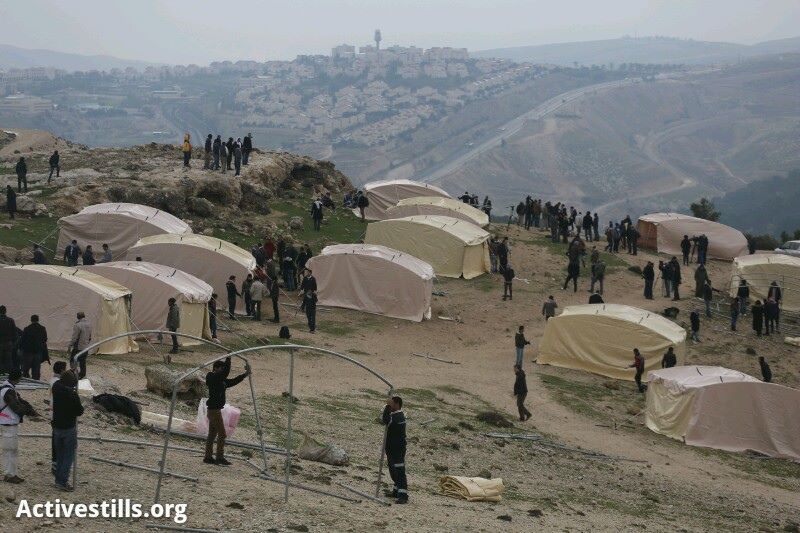
On January 11, 2013, 250 men and women from across Palestine established a new Palestinian village named “Bab Al shams” (Gate of the Sun).
They declared:
We, the sons and daughters of Palestine from all throughout the land, announce the establishment of Bab Alshams Village (Gate of the Sun). We the people, without permits from the occupation, without permission from anyone, sit here today because this is our land and it is our right to inhabit it.
A few months ago the Israeli government announced its intention to build about 4000 settlement housing units in the area Israel refers to as E1. E1 block is an area of about 13 square km that falls on confiscated Palestinian land East of Jerusalem between Ma’ale Adumim settlement, which lies on occupied West Bank Palestinian land, and Jerusalem. We will not remain silent as settlement expansion and confiscation of our land continues. Therefore we hereby establish the village of Bab Alshams to proclaim our faith in direct action and popular resistance. We declare that the village will stand steadfast until the owners of this land will get their right to build on their land.
“Being South African, it felt like walking into another apartheid ambush”
The Three Wise Men blocked by Israel’s Apartheid Wall
A delegation of South African Christian Church leaders has just returned from a one-week solidarity visit to the holy cities of Bethlehem and Jerusalem in Palestine-Israel. On their return, they released this joint statement [extracts]:
“Being South African, it felt like walking into another apartheid ambush. We witnessed violations of international law on so many levels – the multiple Israeli house demolitions, the discriminatory Israeli legal system, the daily intimidation of Palestinians by the Israeli Defence Forces, the Israeli Apartheid Wall and its associated regime of restrictions on movement and access for Palestinians, the imprisonment of a large percentage of Palestinians (including children), the ongoing confiscation of Palestinian water and land, the closure of previously bustling Palestinian streets and businesses, separate pavements for Israelis and Palestinians…”
Continue reading “Being South African, it felt like walking into another apartheid ambush”
Sex, Lies and God’s Promise: Response to a Diatribe
An article titled “In Defence Of Israel” is being circulated to media-persons in India by the Spokesman of the Embassy Of Israel in Delhi. This article, published in Open magazine, was written by Jonas Moses Lustiger (a student based in Paris, who has earlier lived in India). The article names me specifically, and refers to mine and Aditya Nigam’s posts on Palestine in Kafila, but I was not interested in engaging with Lustiger’s largely ill-informed, propagandist and misrepresenting rant. But now that it appears we are responding directly to the Israeli state, I feel perhaps I should put some things on record.
(Our three posts on Kafila are Nakba and Sumoud, Living the Occupation and Imagining Post-Zionist Futures)
Let me begin by stating my complete agreement with Lustiger on three of his key statements in the Open article.
First:
It is true that Israel’s current government is one of the worst it has known and most of its citizens have lost hope for peace. It is also true that Israeli society is turning more racist, intolerant and ignorant of the suffering and existence of their immediate neighbours—Palestinians. Of course, the Palestinian people have been denied many rights and have been living under precarious conditions since Israel’s 1967 occupation of the West Bank and Gaza. True, they have been repeat victims of unjustifiable violence and a large proportion of Israeli politicians deny their claim to an independent land, even as Israel threatens the viability of a Palestinian state by wielding tools of colonisation.
Pretty much sums up our three posts on Kafila – what’s not to agree?
Second: Continue reading Sex, Lies and God’s Promise: Response to a Diatribe
Amitabh Bachchan in Gaza

Radhika Sainath writes:
Palestinians in Gaza love Indians. They love Indian dancing, they love Indian music, they love Indian clothes. Whenever I walk out of the house, someone inevitably asks “hiyya hindeyee?” Is she Indian? ”I knew it!” they say when the response is in the affirmative. “Bheb al Hind,” I love India….
So Amitabh, Abhishek, Aishwarya, Amir, Hrithik, Kareena, Salman, Shahrukh, if you’re reading this, how about a shout out to 1.5 million of your biggest fans in the Gaza Strip? Israel has forbidden pasta, tea, cement and freedom flotillas from entering Gaza, but it hasn’t stopped Bollywood. We watch you under the Israeli drones and the F-16s, after being shot at by the Israeli navy and army while fishing, picking olives or going to school. You bring a sliver of joy to people living under the world’s longest occupation in the world’s largest prison, and for that we thank you.
Read the rest of this post by Radhika Sainath at Notes from Behind the Blockade Life: politics and nonviolent resistance inside the Gaza Strip.
We are fine in Gaza. How about you?

Palestinians carry the bodies of members of the al-Dalo family during their funeral in Gaza City. Reuters
Listen to the Palestinian singer and writer—Khaled El-Hibr sing these words on Jadaliyya:
We are fine in Gaza
How about you?
We are fine under attack
How about you?
Our martyrs are under the rubbles
Our children now living in the tents
And they ask about you
We are fine in Gaza
How about you?
Gaza Solidarity actions in Delhi and Lucknow

Lucknow Monday, November 19, 2012

Delhi, November 19, 2012

Photographs of Delhi demonstration by Benny Kuruvilla. For more pictures, click here.
Proof-reading The New York Times

Worldwide protests as Israel attacks Gaza
List of world-wide protests from Bethlehem to Quebec, November 14-17, 2012

Child wounded in Israeli air strike on November 14th
[From The Electronic Intifada]
Yesterday Israel ended an effective truce with armed groups in Gaza, and carried out the extrajudicial execution of Ahmed al-Jabari, the commander of the military wing of Hamas.
Israeli attacks today killed at least seven people including two young girls in Gaza.
Aside from the fact that it almost always violates truces and ceasefires, seeking escalation where instead there could be calm, what motives might Israel have?
Israel’s “Minister of Home Front Defense” [Avi Dichter] says Gaza must be “reformatted” as if it were a computer hard drive, just like Israel did in the West Bank in 2002 during a series of massacres it called “Operation Defensive Shield.”
Israel’s Ynet reported in Hebrew that Dichter
said in a closed meeting, in the course of his visit in the south under the escalation, that “there is no other choice, Israel must carry out a formatting action in Gaza, actually format the system and clean it out, the way we did in Judea & Samaria during Operation Defensive Shield.”
Protest in London over Israeli airstrikes in Gaza in 2009

Imagining Post-Zionist Futures – Israeli Apartheid and Palestinian Resistance III
This post is the third of a series based on a visit by Nivedita Menon and myself to Palestine in mid-September 2012. The first two are Nakba and Sumoud and Waiting for the Third Intifada.
It was the 18th of September, our third evening in Ramallah. We were at the Ramallah Cultural Palace to listen to Palestinian youth bands perform. The place was teeming with people, mostly young, in their twenties and thirties. The hall was packed, the atmosphere so electric that even if Magid had not been there to explain, there was no way we could have missed the excitement and the anger that the songs evoked in the audience. Interestingly, not all the songs were about Zionist oppression and the travails of everyday life in occupied Palestine. When a song critical of the PA (Palestinian Authority) began, the hall went up in spontaneous applause, endorsing the sarcastic lyrics directed at PA that has lately been involved in carrying out repression on its own population.
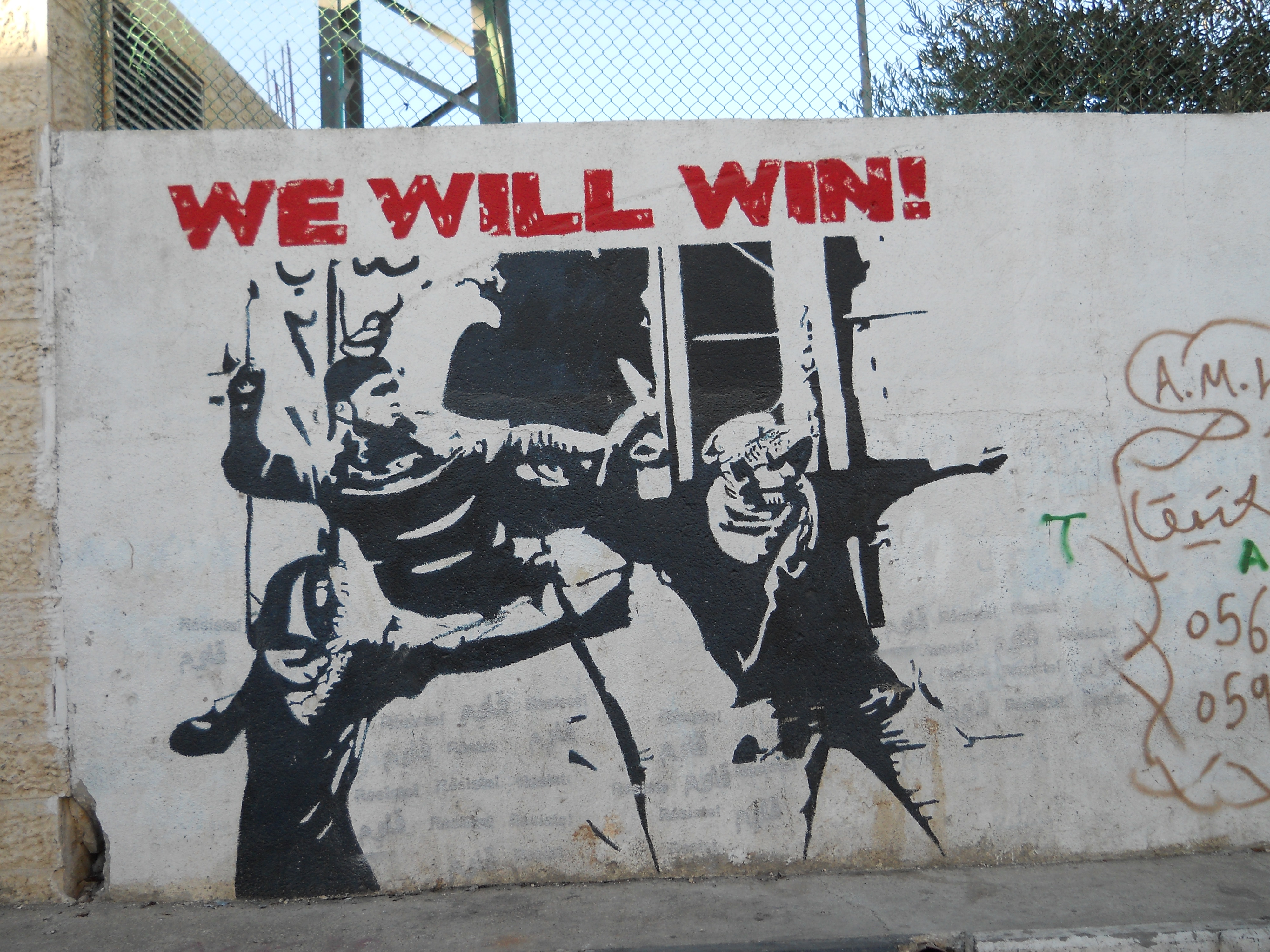
The complexity of the current phase of the movement arises from the fact that now, the new forces of Palestinian liberation are arrayed, not merely against Israeli occupation but also against this entity called PA and the Oslo Accords that put in place the political arrangements that mark the division of territories today. An arrangement that was supposed to be merely an interim one lasting but a few years, until the question of Palestinian statehood could be settled, has become a quasi-permanent one that is seen to threaten the longer-term goal itself.
Continue reading Imagining Post-Zionist Futures – Israeli Apartheid and Palestinian Resistance III
“We may weep but we will stay”: Women resist evictions in Palestine: Kalyani Menon Sen
Guest post by KALYANI MENON SEN

- Umm Nabil’s settler-occupied house is painted with Israeli symbols. (Photo: Aruna Rao)
Umm Nabil al Kurd is 82 years old. She is tiny and frail – her hands tremble as she takes the mike. But her voice is steady as she describes how she lost her home.
“We came to Jerusalem from Haifa as refugees in 1948” she says. “The Jordanians allotted us our house. We have lived there for 60 years – my children were born there. It was small and broken when we moved in – we extended it and improved it as our family grew. We planted a garden. When my son got married and the grandchildren came, we built a separate unit for him at the back of the main house. We built with our own money, with our own hands. Then, two years ago, the Israelis came with the police and told us to leave. They said the house was theirs. They pushed me to the ground, called me filthy names, turned their dogs on me. They threw out our furniture and moved into the house. We went to court but the judge said we were occupying the house illegally – he told us to pay 100,000 shekels as rent for the years that we had lived in the house. We had to pay – my husband would have been imprisoned if we did not. We are still fighting the case – the next hearing is in July but I don’t know if we will ever get the house back.” Continue reading “We may weep but we will stay”: Women resist evictions in Palestine: Kalyani Menon Sen
Israeli Apartheid and Palestinian Resistance II – Living the Occupation
Planning to visit Palestine? Good news, Indian citizens don’t need a visa to enter Palestine. One small thing though. Palestine is occupied, and you cannot enter Palestine except through Israeli border control. The occupied Palestinian territories (OPT) have no control over their external borders.

Entry to Ayda refugee camp in the West Bank, established in 1950. The key is the symbol of the Right of Return of Palestinians. (Photo AN/NM)
Whether you fly in through Ben Gurion airport in Tel Aviv, or enter by road from Jordan or Egypt – it’s an Israeli visa that is required – there is no such thing as a visa to Palestine. Indeed, from the point of view of the occupying state, there is no Palestine, only Palestinian Territories – that is, West Bank and Gaza, the two green bits in the fourth map reproduced in the previous post. (There are also no Palestinians, according to Israeli state classifications – there are Israelis and there are bureaucratically differentiated Arabs, as we’ll see below). Continue reading Israeli Apartheid and Palestinian Resistance II – Living the Occupation
Israeli Apartheid and Palestinian Resistance I – Nakba and Sumoud
[In September 2012, Aditya Nigam and I had the incredible good fortune to visit Palestine. This post is the first of a series in which we reflect on our experience and what we learnt there. We stayed in Ramallah, visited and interacted with colleagues at Birzeit University and spoke at a conference organized by Muwatin, a research institute based in Ramallah. We met a large number of inspiring people who pushed the frontiers of our minds, and we came away humbled and moved by the dignity of a people living through the brutal occupation of their lands by the Zionist state of Israel, with limitless courage and sense of humour intact.
Deepest gratitude to Rema Hammami of Birzeit who drove us around Jerusalem, and whose inimitable commentary gave us a live historical sense of her country.
Words are inadequate to thank our friends Magid Shihade and Sunaina Maira, whose passionate love of Palestine and determination to help us make the most of our brief stay there, expanded our horizons continually.]
On the 15th of May 1948, the state of Israel was born, dispossessing Palestinians who had lived on that land for centuries. Fleeing terror and genocide in Europe, and anti-semitism globally, Jews from all over the world poured into Palestine.
Why Palestine? Why was Palestine given to the Jews as their home? And whose property was Palestine, that it could be given away? Why were people who had never done any harm to the Jewish people made to pay the price for European anti-semitism? It was Germany and Italy and Poland that had in fact, run concentration camps; it was any number of other countries of Europe that could boast of centuries-old histories of violent anti-semitism. Why were not parts of these countries carved out to make a country for the people they had wronged?

Maps showing the gradual obliteration of Palestine by Israel
Continue reading Israeli Apartheid and Palestinian Resistance I – Nakba and Sumoud
Three poems by Meir Wieseltier
Guest post by ADITYA SARKAR
Here are three poems by a remarkable Israeli dissident poet Meir Wieseltier. Over and above anything else, they’re beautiful poems, but they might also have something to say about the recent attacks of Gaza and the West Bank, even though they address much earlier events and times If nothing else, they might be a reminder that the kinds of issues related to Israel/Palestine that have been discussed on Kafila and elsewhere are in no sense new – each poem seems absolutely contemporary, even though they were written in 1973, 1978 and 1986 respectively. They might remind readers that far from being a ‘tragic mistake’, as the BBC and other liberal apologists have it, the attack on the flotilla represents the mainstream, indeed the only, dimension of Israeli state policy.
The last of the three poems was actually reprinted in The Nation on 15 April 2002, four days after the Israeli massacre of Palestinians at Jenin, which killed fifty people – another absolutely typical act of ‘Israeli self-defense’ that most accounts blank out. Continue reading Three poems by Meir Wieseltier

